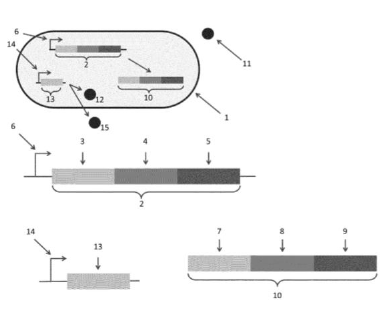Dans la même rubrique
-
Partager cette page
Method and system for the production of recombinant proteins by cells [Offre de technologie]
The technology in a nutshell
A new process that is designed to increase the quality of recombinant proteins production by a toxin/anti-toxin tool.
State of the art
Typically, production process of peptides or proteins of interest by host cells, or molecular cloning, requires the use of one or more replicon sequence(s), such as plasmids carrying one or more gene(s) encoding the protein(s) of interest. Cells in bioreactor usually present a high heterogeneity. It has been demonstrated that the growth of plasmid bearing cells, especially bacterial cells, is significantly reduced compared to plasmid free host cells. Indeed, peptide or protein production coming from gene of interest represents a significant burden on the metabolism of the cell. Therefore, it is necessary to select cells that keep the gene of interest. This selection is efficiently done by the use of a selective tool, such as antibiotic resistance gene or pair of poison and/or antidote genes. However, classical systems do not prevent frameshift from translation, truncated versions of the protein of interest... which could lead to a contamination by mutated proteins.
The invention
The invention concerns a cassette sequence for the transformation of a host cell includes at least: a first nucleotide sequence encoding a pep¬tide or protein of interest to be produced by the host cell. The first sequence is linked to a second nucleotide sequence providing resistance to a toxin or encoding an antitoxin peptide to the toxin. The nucleotide sequences are organized in such a way that production of the peptide encoded by the second nucleotide sequence(s) is translationally coupled to production of the peptide encoded by the first nucleotide sequence. Thus, any modification of the protein of interest do not enable the expression of the antitoxin that leads to the death of the cell host. The quality and the yield of expression of the awaited product is then efficiently improved.

Key advantages of the technology
- Efficient production of peptides or proteins of interests ;
- High production and quality yield guaranties.
The team
The laboratory specializes in the genetic analysis of Escherichia coli as well as its phages, plasmids and transposons. The aim of this research is to understand precisely how the poison/antidote systems work by investigating the targets of the poisons and by analyzing the molecular interactions between poisons and targets in order to develop new classes of antibiotics; by analyzing the molecular interactions between antidotes and ATP-dependent proteases; by analyzing the regulation mechanisms that trigger the programmed death of the bacteria caused by these systems. In addition, the laboratory is using the poison/antidote systems to develop innovative technological tools. Some of these tools are now used throughout the world in cloning experiments, i.e. the production of DNA fragments which are genetically identical.
More info about the lab
Relevant publications
- Messing up translation from the start: How AtaT inhibits translation initiation in E. coli, Van Melderen L., Jurenas D., Garcia-Pino A. (2018). E. coli. RNA Biol. 15(3):303-307.
- Novel toxins from type II toxin-antitoxin systems with acetyltransferase activity, Jurenas D., Garcia-Pino A., Van Melderen L. (2017). Plasmid. 93:30-35
Keywords
- Micromolecular biology
- Bioprocess engineering
- Industrial biotechnology
- Toxin-antitoxin systems
- Genetic engineering
Collaboration type
- Collaborative research
- Licensing
IP status
PCT publication number: WO2016001447
The inventor
- Laurence Van Melderen
- Gilles Vanwalleghem
- Thibault Hallaert
- Baptiste Dumont
- Philippe Goffin
Contact
ULB Research Department
Joachim Ruol
Business developer
+32 (0)2 650 30 67
joachim.ruol@ulb.be
